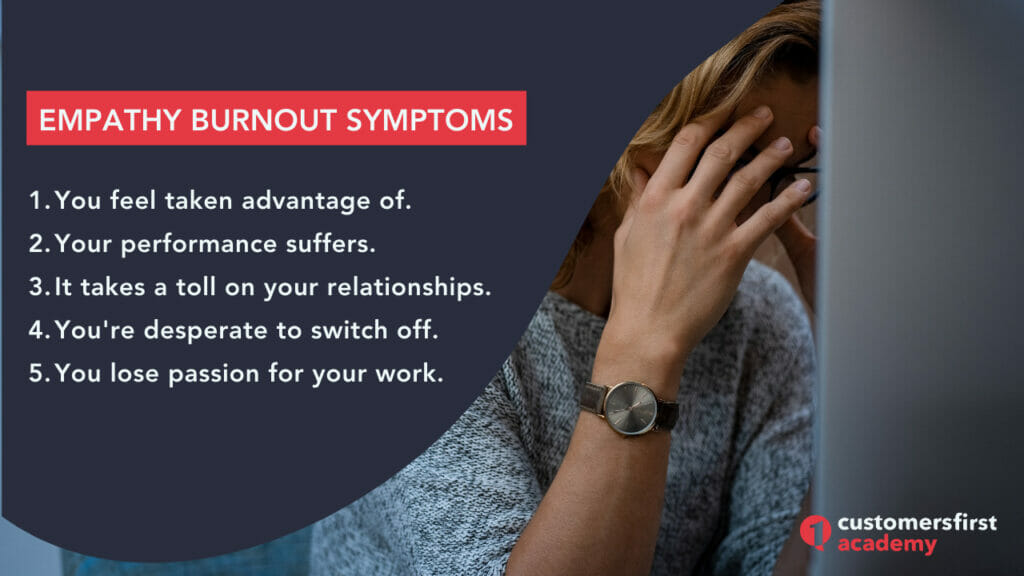Have you ever felt like your empathy is being used against you?
You’re not alone. Empathy burnout is a real thing when you experience empathy fatigue or overwhelm.
It’s important to pay attention to signs of empathy burnout for your wellbeing and career success. Because empathy is crucial for working directly with customers, managing empathy fatigue will ensure it doesn’t become a drain on your performance and mental health.
Before we get into the signs of empathy burnout, let’s talk about empathy and what it means.

What is empathy?
Empathy is understanding how someone feels, what they are thinking or experiencing. It is the action of understanding, being aware of, and being sensitive to others’ feelings.
In other words, empathy is putting yourself in someone else’s shoes.
It’s a skill that allows you to create stronger connections with your colleagues and customers, understand other people’s needs, and provide better customer service.
Empathy sounds great, doesn’t it? It certainly has many benefits, but it also has its drawbacks. Unfortunately, empathy can also be overwhelming if not managed correctly.
By learning about empathy burnout, you can make sure empathy doesn’t become a burden but remains a benefit to your career as well as the people you care about.
Subscribe to our podcast to listen and learn on the go!
What is empathy burnout?
Empathy burnout is when your work becomes taxing on your emotions, making you feel exhausted, helpless, or cynical about what you do. You may find that even though you used to enjoy your job, you no longer feel this way and begin to resent what you do.
Do any of these sound familiar?
- You constantly feel stressed and overwhelmed after interacting with customers.
- Your home life suffers because you are always thinking about your job.
- You have no desire for your job anymore, even though it has been an integral part of your identity for a long time.
- You dread going to work each day.
If these thoughts sound familiar, read on to learn about common signs of empathy burnout.
Empathy burnout symptoms
1) You feel taken advantage of
Managing empathy can be tough. It’s easy to become so focused on caring and understanding others that you forget about taking care of yourself.
You might find yourself saying yes to everyone and everything, but this is dangerous because it means you may not only drain yourself emotionally but over-commit and burn out too.
This will not just cause empathy fatigue, which leaves you feeling helpless and resentful, but will also affect your career as you struggle to complete all the assigned tasks.
2) Your performance suffers
When empathy becomes overwhelming, your ability to provide quality customer service begins to slip, affecting your career aspirations.
If empathy is a key function of your role, empathy burnout can lead to lower energy, decreased job satisfaction, and poor performance.
You may find yourself dreading coming into the workplace or starting every morning thinking: “today’s going to be tough.”
You might even feel that empathy has become an added burden to your career rather than something that helps it flourish.
3) It takes a toll on your relationships
You might feel resentful towards those you care about and guilty for having empathy fatigue in the first place.
Your lack of empathy toward those closest to you could cause arguments, tension, or even distance as your empathy burns out.
You may even feel so drained from empathy fatigue that you don’t have any energy left over for those close to you.
4) You’re desperate to switch off
Burnout can leave even the most high-functioning people feeling completely drained. It isn’t easy to switch empathy on or off.
Once empathy fatigue becomes overwhelming, you might find yourself calling in sick more often and needing time to recover.
If empathy becomes too much for you, it’s important that you speak up about what’s happening so that empathy fatigue doesn’t affect your performance and wellbeing.
5) You lose passion for your work
Empathy makes your work more meaningful and connects you with others in a way that can be invigorating and exciting.
However, empathy burnout can leave even the most passionate people feeling isolated, helpless, exhausted, or cynical toward their work.
It’s important to look after yourself first so you can better serve others.
Resting regularly, eating healthily, exercising, getting enough sleep, and surrounding yourself with positive people are all key to empathy management.

What can empathy do for your career?
It’s important to recognize empathy burnout and take steps toward recovery as soon as possible before your performance begins to suffer.
Having empathy is a key component of success in the workplace, but it must be managed if you want to continue flourishing in your role.
Overall, empathy will enhance your relationships with others and help you feel fulfilled at work, which can ultimately improve your career prospects.
Being an empathetic person who cares about other people is what makes you successful in a customer-facing role! It is great for your career, but it also needs to be nurtured so that empathy is sustainable rather than overwhelming.
How to avoid empathy burnout
Remember, empathy should be a tool to help you advance your career, not hinder it.
If empathy is taking over your life, try these tips for recharging your energy:
Recharge your batteries
Take time to recharge yourself mentally and emotionally each day; self-care is key! Take time out for reflection. Try meditation, relaxing walks, listening to your favorite music, or even sitting in silence. These activities will calm your empathy brain and restore empathy energy. Stress exacerbates empathy burnout, so keeping stress levels down is important.
Treat self-care like an important meeting
Make sure you schedule some recovery time into your calendar, just as you would any other appointment that is required for your career development. Make self-care an important part of your daily routine, just as you would brushing teeth or taking a shower.
Create boundaries in your relationships
If empathy becomes extremely draining, take action to lessen the emotional load on yourself. Try not to get involved in other people’s problems if it is at the cost of neglecting your wellbeing.
Make empathy your superpower at work
For many people, empathy means passion and excitement about their work. It allows them to see the world from another person’s perspective and helps them to build meaningful relationships with customers and their colleagues.
Start taking steps today to manage empathy effectively and protect yourself from empathy burnout.
Being an empathetic person who cares about other people is what makes you a great professional, team player, and customer advocate.
Recommended resources
To learn more about empathy, check out the following articles:
Empathy vs. Sympathy vs. Compassion: What’s the Difference?
Empathy Superpower: The Key to Success at Work
Leading With Empathy: How Empathy Helps in Business
